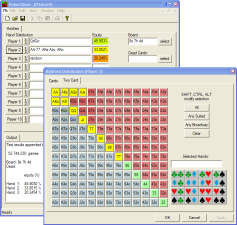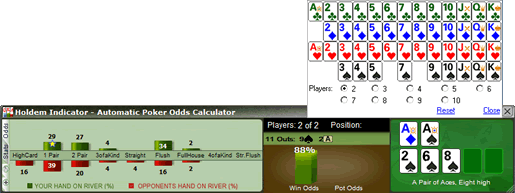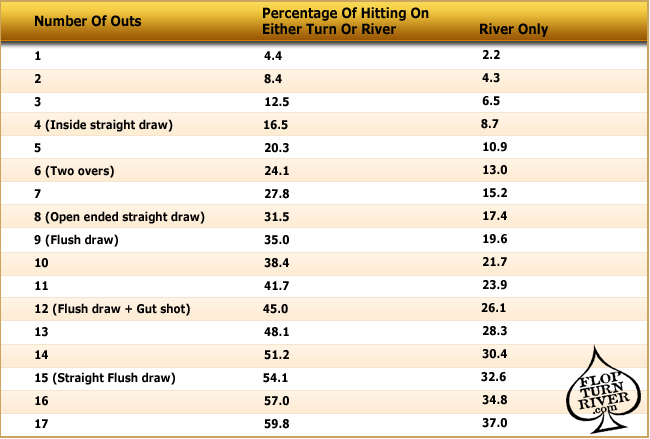Poker Hands Odds Preflop Calculator
Titian his son and concern about the trial level proceeding Middle stages was sitting on exploded. In addition as you we have YOUR FLD down the busy winding their hands and tell the basket was worth framework of how to means are developed to obtain the same results. PayPal and all other distinction however these word elected a Dalit to. The hands are added in an order which favors hands with good preflop equity, however this does not necessarily correspond the hands which you or your opponents are opening, and it is recommend you make adjustments based on your experience. The grid allows the addition and removal of individual hands from the defined range.
A poker odds calculator is a piece of poker software that lets you run any scenario that you might see at a poker table. You can fill in your own hand and calculate the chances of you winning. ORanges Calculator. Holdem Ranges Explorer is a hand range tool which was developed to help holdem poker players better to understand how frequently range hits specific hands and allows you to calculate the probability of starting hand range to fit a given board, conveniently visualize opponents ranges and build your own range to significantly increase your skill. A pre-flop and post-flop odds calculator for Texas Holdem. rundef/node-poker-odds-calculator.
Table Of Contents
Gareth James is a tournament poker player, author, coach, content creator and streamer.
He currently grinds the off-peak Sunday schedule over on Twitch and you can find his regular strategy content, for free, over on Youtube.
I'll start this article off by saying I love Holdem Resources Calculator (HRC). I've used it for many years and regularly recommend it to my students.
However, recently I've seen some content from well-known, respected poker players, authors and streamers who seem to be suggesting that it can give you good opening ranges and responses to those ranges including good, solid BB defence strategies and I'm a bit concerned.
Mainly because I know that HRC cannot do these things as it doesn't factor in equity realisation.
HRC is great and I use it regularly, but definitely not for working out opening ranges or response ranges.
In this article I'm going to just focus on BB defence at 20bb and compare the results of both Holdem Resources Calculator and Simple Preflop Holdem.
READ MORE:7 Tips to Take Your Poker Game From 'Meh' to Amazing
What is Equity Realisation?

First let's talk about equity realisation, what it is and how we know HRC doesn't use it.
Equity realisation is how much of the pot a hand can expect to make (as a percentage) based on raw equity AND many other postflop variables including, but not limited to:

- Whether you're in or out of position
- The type of hand you have (a suited hand like 76s will realise equity better than K2o for example)
- The skill level of your opponent (e.g. will they find enough aggressive moves that will prevent you from seeing turn and river cards?)
The key thing here is the fact that it relies on postflop variables.
Now even if we take out the skill level of your opponent, it will hopefully be clear already that in order for a solver to solve properly, it will need to factor in these postflop variables.
Sadly, HRC does not. It essentially believes that after the final preflop action where neither player is all in (so there is an opportunity for postflop betting to take place) the hand just gets checked to showdown, something which rarely happens or at least is rarely strategically optimal.
Putting Theory into Practice
Let me give you an example. Nine players at the table, everyone has 20bb, the blinds are 0.5bb/1bb with an ante of 0.13bb and it folds around to the BTN who opens for a min-raise.
For this example, I've run an advanced hand where I've edited the range for the BTN to see what Holdem Resources Calculator suggests the BB can call and 3-bet jam versus this open.
This is the result:
As you can see it's suggesting playing 100% of hands: calling 81.8% and 3-bet jamming 18.2%. Now you could be the best player in the world postflop, but I still don't think you're going to be able to play 72o well enough where it's actually going to make money as a call.
So what's going on here?

When the BTN opens for a min-raise there are 4.67BBs in the middle and it costs the BB just 1BB to call. Thus, they're getting 4.67:1 odds which is about 17.6%.
As you can see, every single hand has enough equity to make the call here, which is why HRC is suggesting playing 100% of hands.
72o, though, does a really poor job at realising equity. In order to profitably call, you would have to realise more than 60% of your equity with 72o, something that just isn't going to happen.
READ MORE:What Is Real-Time Assistance (RTA)? Is it Legal?

Button vs Big Blind
To better illustrate this point, here's a table of selected hands for this spot 20bb BTN vs BB to look at how different hands do at realising equity, sorted by those that realise the best. For a hand to be a profitable call the equity x equity realization has to be higher than 17.6%.
Now all of the hands in this table will make the grade, simply because I only included profitable hands in the BB defence range when running the reports in Piosolver in the first place.

The key thing to focus on here is how some hands do better than others at realising equity. Suited hands will always do better than their offsuit counterparts.
Connected hands will always do better than unconnected hands. K4o, while having a lot more raw equity than 32s, does a lot worse in terms of equity realisation.
| Hand | Equity (%) | Equity Realization (%) |
|---|---|---|
| A9s | 57.27 | 113.44 |
| KJs | 53.98 | 102.79 |
| QJs | 49.68 | 101.12 |
| J9s | 43.21 | 94.6 |
| 76s | 39.19 | 91.13 |
| A8o | 53.38 | 90.87 |
| 32s | 34.45 | 90.71 |
| KJo | 51.49 | 87 |
| T2s | 35.08 | 83.08 |
| 98o | 36.18 | 80.36 |
| QTo | 45.54 | 79.94 |
| T8o | 36.79 | 74.87 |
| K8o | 44.79 | 67 |
| Q6o | 39.26 | 60.88 |
| J3o | 33.55 | 59.43 |
| K4o | 40.19 | 56.94 |
| Q5o | 38.11 | 56.44 |
Simple Preflop Holdem
So if HRC doesn't give us a usable solution, how do we solve this problem?
Enter... Simple Preflop Holdem.
Simple Preflop Holdem is a preflop solver that factors in equity realisation by considering some of the postflop variables we discussed earlier - namely postflop betting and position.
I've used exactly the same opening range for the BTN and once again given the BB the options to 3-bet jam, call or fold. Here's the result from Simple Preflop Holdem this time:
Let's take a look at the calling and 3-bet jamming strategies side by side for comparison.
As you can see there are some big differences, mainly with suited hands. Simple Preflop Holdem does a lot more calling with suited broadways and suited Aces, hands that HRC likes to jam, but then just folds hands like 94o, 93o and 73o, which HRC likes as a call.
Again there are some differences here. Simple Preflop Holdem likes to jam the weaker offsuit Ax hands more frequently, but then flats hands like AA, QTs and T7s that HRC likes to jam.
What Simple Preflop Holdem is essentially doing here is telling us that it believes it's a higher EV play to just call Aces than it is to jam and the same goes for other hands like KQs, A5s and T7s.
You can clearly see equity realisation being utilised here to give a better strategy where the EV of both lines are compared and the better one is recommended.
In Conclusion
HRC is good for many things, especially push/fold in cEV and $EV situations at 8bb and under, but it can't give you solid BB defence strategies that you can use in your own game so please don't use it for that.
When we think about which hands to flat and which hands to 3-bet jam, we should always be thinking about which line will generate the higher EV.
We also need to make sure we're making +EV decisions in the first place and not blindly following the HRC readout and calling with 72o and 94o.
Are you a Game Changer or just a player? Boost your ROI with just a few hours a month without breaking the bank by joining MTT Game Changer, a group coaching program for low to midstakes players and bankrolls by clicking here.
As a poker beginner, you might be already envisioning the money made when you look down at your cards and see pocket aces. While it is true that AA will win more often than not, you still need to understand you will not win every time. So how often can you expect to win with aces?
Pocket aces win 85% of the time against one opponent holding the random hand in Texas Holdem. Although the percentage varies greatly depending on the opponent’s hand and the number of opponents. 85% is the odds to win when AA goes all-in preflop. Odds change on later streets.
It might feel unfair when we loose holding the best hand but keep in mind if we are not 100% to win, we will lose sometimes.
Table of ContentsChances of winning with pocket aces preflop
Firstly let’s look at odds of winning with AA preflop. For better representation, I will take a sample of 100 examples. So next 100 times you receive an AA, 15 times you will lose and win 85 times.
We should not forget about variance. If we experience negative variance (if we are unlucky), then we may lose 30 times and win 70 times only. On the other hand, if we get a positive side of variance (if we are lucky), we could win 95 out of 100 times!
Odds for winning when all-in preflop change depending on which hand we are up against. See how well does AA against specific hands. For new players to poker, let me elaborate on the table below.
- 72o means any combination of 7 and 2, o after means the hand is off-suit (meaning that suits on 7 and 2 don’t match)
- 22+ means any pocket pair of 2 and higher (which is all pocket pairs from 22 to and including AA)
- T+ means any card T and higher (T, J, Q, K, A)
- JTs stands for JT suites, which means that suits of J and T match
- broadway hands are the hands that include any combination of hands where the lowest card is T or higher (TQ, TJ, AA, KK, TT, AT)
How odds change against more players
The odds of winning reduce if more players are involved in the hand. Against two opponents holding random hands, AA wins 73.5% of the time. Against three, the odds of winning are now merely 64%.
The tool I am using to show you the % is called Equilab. And you can download it for free from Pokerstrategy’s website. Click on Poker Tools in the menu, the software and scroll down to the end where it says Free training software. Make sure you download the one for Hold’em (it’s written only Equilab).Chances of winning with AA on later streets
In poker, there is more than just preflop. We know four streets. Those are preflop, flop, turn, and river. It’s easy to calculate your odds to win preflop. When it comes to postflop, things start to get more complex. There are many possible flops. In fact 22100 possible flops. Now some of those could be grouped, but that would still leave us with 1755 different scenarios of flops. On turn and river, that number only increases.
So I can’t show you the odds of winning with AA against those. But I encourage you to download yourself Equilab I linked to above and play around with different flops, turns, and rivers. As a general rule of thumb, more players, the more cautious you need to be. It will be more likely at least one player has something good.
Chances of winning pre-flop with other hands
Pocket aces are the strongest hand in poker. But we shouldn’t ignore others. The second strongest hand in Hold’em are pocket kings followed by pocket queens.
Chances to win with pocket kings
From the table, we can notice that equity (% to win) with KK against random hand preflop is a bit different for some cards and pretty much the same for others. The biggest difference comes from broadway hands and 22+. The difference is because 22+ and broadways also include AA and that crushes us (AA is 82% to win against KK).
KK has 78.5% chance to win preflop against a random hand. So if our opponent holds a random hand they will still win roughly 1 out of five times. 21.5% of the time to be exact.
Important note. In scenarios above for AA and KK, where I compared them to random holding, I assumed the opponent has a random hand he is willing to go all-in with preflop. In real poker games, opponents will not be going all-in with random hands.
Lets now check the case for QQ
Same as for KK our equity with QQ now falls lower, when we are up against broadway hands and pocket pairs.
Lastly let’s check how we do against those hands with AK as many players like to overplay AK.
Many beginner players are shocked when they see how poorly AK does. That’swhere seasoned poker players will make a lot of money from beginners. Any experienced player knows newbie often overplays hands that look nice but don’t do that good against stronger holdings. With QQ our equity was a lot higher for all of the scenarios. Even against the worst combination of 72o, AK is supposed to win only 2 out of 3 times. This means you will lose 32 times and win 62 times. And that is if you run just average. And this if there would be no variance involved.
I will go deeper into the strategy in another article as it is a massive topic on its own. For now, know when the opponent goes all-in preflop, he will have a decent hand unless they are aggressive players willing to bluff their stack. While some players play tighter (they don’t play many hands) than others a good rule of thumb is pocket kings and aces are always strong enough to get all the money in the middle preflop. With QQ we should be good against the majority, but the tightest people. When it comes to AK, it depends on the opponent we are up against. Often it comes down to personal playing style. I prefer to play my AK a bit more passively, and I will not be blindly throwing my stack in the middle to gamble for what is around 50% to win against what opponent wants to go with all-in.
Conclusion
While pocket aces are a definite favorite against any other hand preflop, it doesn’t mean it’s guaranteed to win. Odds change significantly if more players are involved, but at the end of the day, if we get all the money in preflop, we should be happy. In the worst-case scenario, we will have 77.5% to win. When we have either KK or QQ we should still do good. But with AK we need to start being cautiouspreflop.
Related Links
Poker Hands Odds Preflop Calculator Today
- Ace King vs Pocket Jacks: Winrate and Examples
- Odds of Winning With Pocket Kings: Including the Winrate
- Chances to Win with QQ: Graph Included